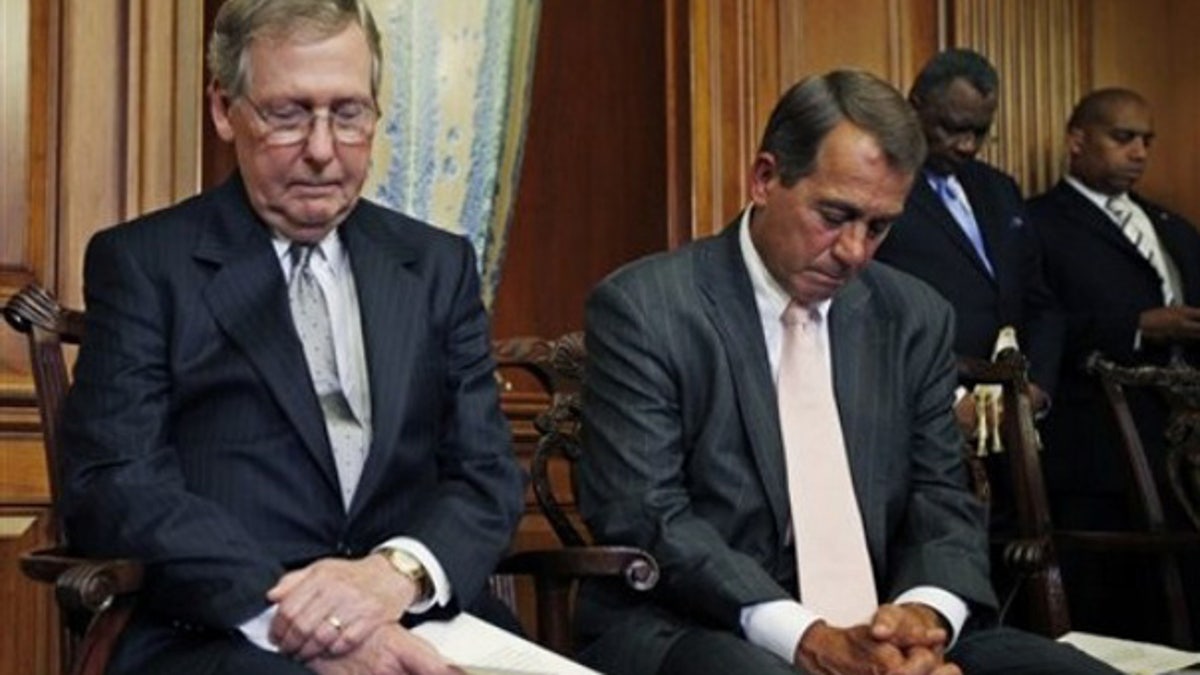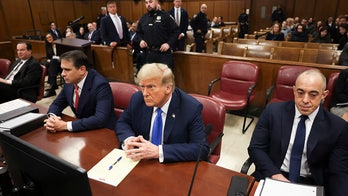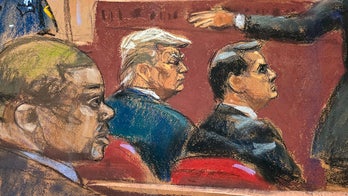
FILE: Senate Minority Leader Mitch McConnell, R-Ky., and House Republican Leader John Boehner, R-Ohio, bow their heads in prayer as they participate in a ceremony on June 16 to unveil plaques recognizing the contributions of enslaved African Americans in the construction of the United States Capitol. (AP)
House Minority Leader John Boehner may have opened a window to a compromise with the Obama administration on Bush-era tax cuts, but no such deal is in the works in the Senate, where the only thing bipartisan about tax hikes is opposition to it.
If tax cuts for singles earning more than $200,000 and couples making over $250,000 a year are allowed to expire at the end of this year, the rate for high-income earners will increase from 35 percent to 39.6 percent.
Senate Republican Leader Mitch McConnell on Monday called for an extension of the cut for everyone for one year.
"I'm introducing legislation today that ensures that no one in this country will pay higher income taxes next year than they are right now," McConnell said in a speech on the floor that excoriated Democrats for excessive spending.
"Democrats spent the last two years putting government in charge of health care, the financial sector, car companies, insurance companies, student loans -- you name it. Now they want the tax hike to pay for it all," McConnell said. "Americans asked the administration to fix the sink, and they remodeled the house instead. And now they're sending us the bill."
McConnell has said several times not to expect Republicans to support anything that falls short of a full extension of tax cuts, though he has stopped short of ensuring that the full conference will be unified.
"Nobody here is talking about process -- particularly since there isn't even a bill yet," McConnell spokesman Don Stewart said Monday. "Republicans, and a growing chorus of Democrats, oppose tax hikes -- particularly in the middle of a recession."
Speaking to families in Fairfax, Va., on Monday, President Obama said that the fighting over the extension of tax cuts revolves around the smallest segment of the population.
"We could get that done this week. But, we're still in this wrestling match with John Boehner and Mitch McConnell about the last 2 to 3 percent, where on average we'd be giving them $100,000 for people making a million dollars or more," Obama said.
On Sunday, Boehner said if he had to take just cuts for the middle class he would, but it's bad policy to limit cuts to the lower brackets. But GOP aides say Boehner and McConnell are not divided on substance, merely on strategy. Boehner said he wants all the tax cuts extended, like McConnell, but is willing to vote for something short of that as a strategic move in the House ahead of November's midterm election.
That didn't stop White House Press Secretary Robert Gibbs from tweeting the suggestion that Republicans can't agree among themselves.
"Disarray = Boehner vs Cantor, Boehner vs McConnell & McConnell vs McConnell - why hold middle class tax cuts hostage to these disagreements," Gibbs tweeted, adding House Minority Whip Eric Cantor, R-Va., into the mix.
At least five Senate Democrats have said they would like all of the Bush tax cuts to be extended for another year or two as the economy slowly recovers from the recession.
"I don't think it makes sense to raise any federal taxes during the uncertain economy we are struggling through," Independent Connecticut Sen. Joe Lieberman said Monday. "The more money we leave in private hands, the quicker our economic recovery will be. And that means I will do everything I can to make sure Congress extends the so-called Bush tax cuts for another year."
"I don't think they ought to be drawing a distinction at $250k," Sen. Jim Webb, D-Va., told Fox News on Friday.
But Senate Democratic leaders have a different view from their rank-and-file, with Majority Leader Harry Reid, D-Nev, suggesting he intends to move a package that does what Obama wants -- extends only middle-class tax cuts.
Reid has argued that refusing to go along with a partial package means Republicans would be allowing taxes to go up on everyone.
"It is unconscionable for Senate Republicans to hold middle-class tax cuts hostage in order to secure more tax giveaways for millionaires and CEOs who ship American jobs overseas," Reid said in a statement. "Today's declaration by Senate Republicans means they are willing to raise taxes on the middle class and small businesses in the middle of a recession."
One senior Senate Democratic leadership aide said Reid could bypass the Senate Finance Committee, the panel responsible for tax legislation, in order to get a vote on the floor that would require Senate Republicans to vote one way or the other on partial cuts. That move is sure to ruffle feathers, the aide said.
According to the source, Reid has spoken with President Obama and House Speaker Nancy Pelosi twice in the last two weeks and all appear to be on the same page.
The Democratic aide said the strategy could change now that members have returned, but the thinking is to charge ahead and extend only tax cuts for the middle class, a less-expensive alternative to extending the full tax breaks approved in 2001 and 2003.
Budget analysts say cutting taxes for 10 years would cost the government $4 trillion, with $700 billion of that going to top-income earners. Republicans insisting on cuts across the board say it will cost a lot less for the federal government if it stops spending money it doesn't have.
"Republicans have come forward with a bipartisan solution to help our economy create jobs – 1) extend current tax rates for the next two years and 2) cut spending back to 2008 levels," said House Ways and Means Ranking Member Dave Camp, R-Mich. "This plan can and would pass if the speaker allows a vote on it and, more importantly, it will provide the certainty employers need to start investing again and creating jobs."
Camp was joined by two other Republicans, Appropriations Committee Vice Chairman Rep. Jerry Lewis of California and Budget Committee ranking member Paul Ryan in calling on their respective committee chairmen to agree to those two requests to avoid votes during a lame duck session that would result in a bloated budget.
Fox News' Trish Turner and Chad Pergram contributed to this report.




